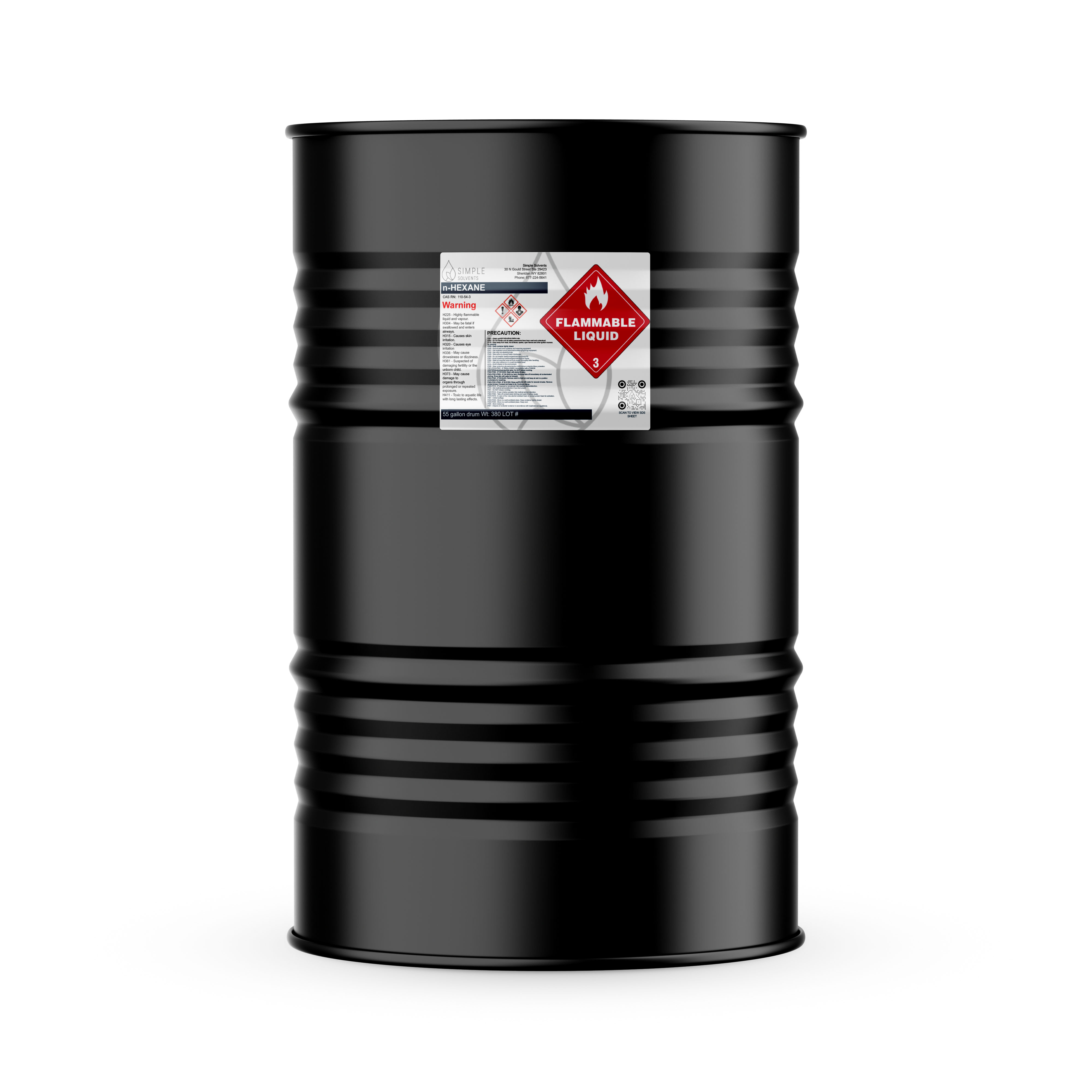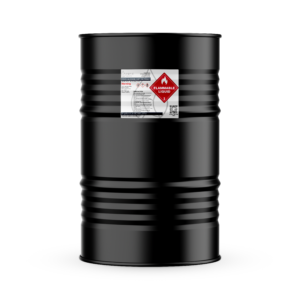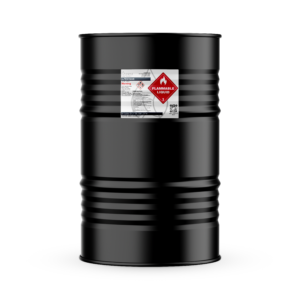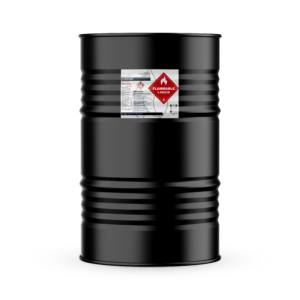Hexane
Hexane technical grade solvent.
$750.00
Bulk pricing & price matching available
Lab Tested
Secure Payments
Quality Guarantee
Fast Delivery
Hexane
Hexane is a highly effective non-polar solvent with extensive applications across various industries. Known for its ability to dissolve oils, fats, and other non-polar substances, this solvent is ideal for use in industrial processes, laboratory settings, and environmental applications. Its high purity ensures reliability and consistent performance, making it a preferred choice for diverse solvent needs.
Industries
- Cleaning & Sanitization: Hexane is used for cleaning and degreasing machinery and equipment, ensuring thorough removal of oils, residues, and contaminants. Its strong solvent properties make it highly effective in industrial cleaning applications.
- Environmental: In environmental testing, it is employed to analyze and extract hydrocarbons and other organic pollutants from soil and water samples, aiding in environmental monitoring and pollution control.
- Government: Applied in various governmental research and industrial processes, the solvent provides a precise and effective solvent solution for a range of applications requiring high-quality performance.
- Laboratory: Hexane is a common solvent in laboratories for processes such as chromatography and sample preparation, where its purity and stability are crucial for accurate and reliable research results. It can also be used for synthesis and extractions.
- Water Treatment: Employed in water treatment processes, it helps extract contaminants and purify water, ensuring clean and safe water for various uses.
- CAS Number: 110-54-3
- Common Names: Hexane, hexanes
- Scientific Names: Hexane
Advisory Statement for Hydrocarbon Hazards – Storage & Handling
Hydrocarbons are a highly volatile solvent with significant evaporation and pressure buildup characteristics. Due to its low boiling point and high vapor pressure, proper storage and handling are crucial to ensure safety and maintain product integrity.
Volatility and Storage Considerations:
- Heat Sensitivity: Hydrocarbons should be stored in a cool, well-ventilated area, away from direct sunlight and heat sources. Exposure to high temperatures can increase the risk of pressure buildup in storage drums, which may lead to bulging or rupture. It is imperative to avoid storing Hydrocarbons in environments with extreme heat, such as warehouses lacking air conditioning or temperature control.
- Pressure Buildup: To prevent pressure issues, ensure that drums of Hydrocarbons are kept sealed and in a stable, temperature-controlled environment. Open drums in areas without adequate ventilation or temperature control pose risks of increased pressure and possible hazardous conditions.
- Open Drums: Having an open drum of Hydrocarbons in an enclosed space can lead to rapid evaporation and the accumulation of flammable vapors. This poses significant fire and health risks, including potential explosions in the presence of ignition sources.
Shipping and Extreme Conditions:
- Shipping Risks: During summer or in areas with high ambient temperatures, there is a heightened risk of drum bulging or leakage due to the expansion of Hydrocarbons vapors. We advise considering these factors before placing orders in warmer months or for locations with inadequate temperature control.
For safety, always ensure proper ventilation, temperature control, and secure storage practices. Following these guidelines helps mitigate risks associated with Hydrocarbon volatility and ensures a safe handling environment.
Marketing money for Feb
Safety Data Sheets (SDS): Customers can access Safety Data Sheets (SDS) for all our products, which provide essential information about the chemicals, including hazards, handling procedures, and emergency measures.
Understanding Hazards: While we handle the hazardous materials, it's important for customers to understand the specific hazards of the products they are purchasing, such as flammability or reactivity, and how to mitigate them in case of emergencies. Always read the safety data sheet before buying, using, storing and disposing chemicals.
Transportation Compliance: Our operations adhere to the Department of Transportation (DOT) regulations for shipping hazmats. Be sure to communicate with your local authorities regarding permits and regulations for buying, storing, using, and disposing of chemicals.
Proper Packaging: We use approved containers, labeling, and packaging materials to prevent leaks, spills, or accidents during transit, ensuring that hazardous materials are delivered safely.
Storage Considerations: Always store hazardous materials in designated areas with proper ventilation, temperature controls, and secondary containment measures to prevent accidents and minimize risks during transportation / storage.
Disposal Procedures: Be sure to understand proper disposal procedures and regulations that are unique to your location.
Emergency Response Plan: Always be equipped with a comprehensive emergency response plan, including procedures for spills, leaks, fires, and injuries related to hazardous materials, to ensure swift and effective response in case of emergencies.
Continuous Monitoring: Regularly monitor and inspect your storage areas, equipment, and handling practices to identify and address potential safety hazards promptly.
- solvent supply made easy
Material Safety Best Practices
When purchasing, using, shipping, storing, or disposing of Simple Solvents’ products, including flammable liquids and solvents, please be aware of the following important considerations and best practices:
Some Simple Solvents products are class 3 hazardous materials and are highly flammable. They may pose significant risks if not handled correctly. Always use these materials in well-ventilated areas away from heat sources, sparks, or open flames. Wear appropriate personal protective equipment (PPE), including gloves and safety goggles, to minimize exposure.
Proper Handling
Exercise caution when handling to prevent spills, leaks, or accidents. Use spill containment measures and follow the safety data sheet for safe handling. Do not tip packaging during transit or storage – keep the product vertical at all times.
Shipping and Storage
Ensure compliance with Department of Transportation (DOT) regulations for the shipping. All shipments must be made to a commercial address with proper labeling and documentation. Store these materials in secure, cool, and dry conditions away from incompatible substances. If the product is hazardous as indicated on the SDS, consult with your local fire marshal regarding storage allowances and local restrictions to ensure compliance with regional safety regulations.
Disposal
Follow local, state, and federal regulations for the disposal of chemical materials. Properly dispose of unused or expired products through certified disposal facilities or programs. Do not dispose in regular trash or down drains.
Emergency Procedures
In case of an emergency, such as a spill, leak, or exposure, immediately follow the appropriate emergency response protocols. Evacuate the area if necessary and contact emergency services for assistance. Use spill containment kits to manage and contain leaks, and refer to the Safety Data Sheet (SDS) for specific first aid measures and response instructions.
Regulatory Compliance
Familiarize yourself with relevant regulations and safety data sheets (SDS) for the materials you are handling. Ensure adherence to all legal and safety requirements to protect yourself and others. Every state and locality may have additional rules & regulations.
By following these guidelines, you can help ensure the safe and responsible use of Simple Solvents products. Always prioritize safety, emergency preparedness, and regulatory compliance in all aspects of handling and disposal.
Recommended Products
Related products

SDA 40B & DPG: Essential Ingredients in Fragrance Formulation
Behind every beautifully crafted perfume, cologne, or room spray lies a complex blend of science and artistry. While fragrance oils

Perfumer’s Alcohol: Uses in Perfumes, Colognes & Room Sprays
Perfume and fragrance creation is both an art and a science. Behind every bottle of perfume, cologne, or room spray
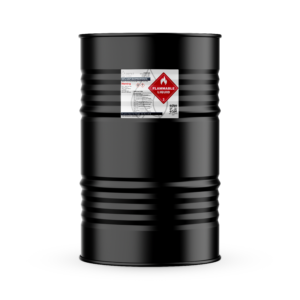
Isopropyl Alcohol Uses
Isopropyl Alcohol Uses by Different Industries Isopropyl Alcohol (IPA) is a versatile chemical with various uses across various industries. It

All You Need to Know About Ethanol and Its Various Uses
All You Need to Know About Ethanol and Its Various Uses Ethanol and Its Various Uses in fuels are essential

The Power of Ethanol: Fun Ethanol Facts on Safety and Industry
The Power of Ethanol: Ethanol Facts on Safety and Industry We are going to go over ethanol facts, uses and

Shipping Dangerous Goods: Regulations and Precautions
Shipping Dangerous Goods: Regulations and Precautions Shipping dangerous goods can be a tricky and sensitive process. It is crucial to

